Airlines Profit More By Flying Less
After years of flying people for less than it cost and trying to make it up with volume, the airlines have changed course.
After years of flying people for less than it cost and trying to make it up with volume, the airlines have changed course.
After a decade of multibillion-dollar losses, U.S. airlines appear to be on course to prosper for years to come for a simple reason: They are flying less.
By grounding planes and eliminating flights, airlines have cut costs and pushed fares higher. As the global economy rebounds, travel demand is rising and planes are as full as they’ve been in years.
Profit margins at big airlines are the highest in at least a decade, according to the government. The eight largest U.S. airlines are forecast to earn more than $5 billion this year and $5.6 billion in 2012.
[…]
Fares in the U.S. have risen 14 percent from a year ago, according to travel consultant Bob Harrell. Flights are more crowded than they’ve been in decades. On domestic flights, fewer than one in five seats are empty. Space is even tighter over the summer and holidays. That’s why it took a week to rebook all the travelers who were stranded by a snowstorm that hit the Northeast over Christmas weekend.
Travelers also face fees these days for services that used to be part of the ticket price, such as checking luggage (usually $25 to $35 per bag) and rebooking on a different flight (usually $150 for a domestic flight, more when flying overseas).
[…]
The industry was profitable in 2000, 2006 and 2007, when the economy was roaring. But those boom years masked the industry’s underlying problems, including high costs and more seats than travelers demanded. During 2008 and 2009, airlines lost a combined $23 billion, but they were also attacking their problems, setting the stage for a comeback in 2010.
- They eliminated money-losing flights. When travel demand recovered, airlines could raise ticket prices for the smaller supply of seats.
- They grounded older, gas-guzzling airplanes. The government says the major U.S. airlines, plus freight delivery companies FedEx and UPS, used 11.39 billion gallons of jet fuel in the first nine months of 2010, down 11.4 percent from the same period a year earlier. The price of a gallon of jet fuel jumped 20 percent year over year, but overall fuel spending rose just 6 percent.
- They added fees. In the first nine months of 2010, airlines collected more than $4.3 billion from fees for checking baggage and changing tickets, up 13.5 percent from the comparable period in 2009.
- They consolidated. Delta Air Lines Inc. bought Northwest in 2008, and United and Continental combined last year. That leaves four so-called network carriers that operate from hub airports, down from six. And Southwest Airlines Co.’s pending purchase of AirTran Airways will combine two of the biggest discount carriers. Fewer airlines should mean higher fares.
So, while flying has become increasingly expensive and aggravating, it’s gotten increasingly profitable. It’s a bizarre business model.
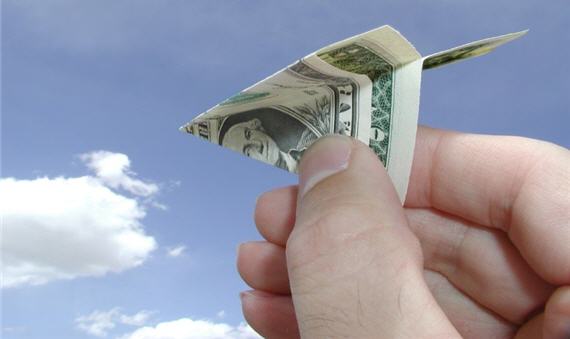

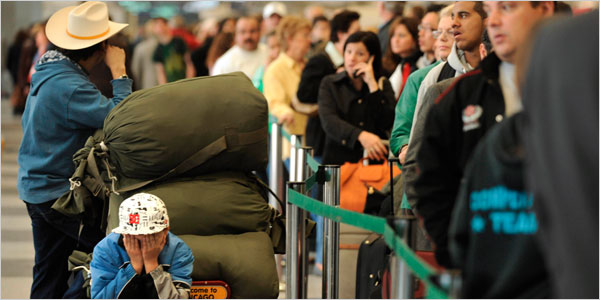
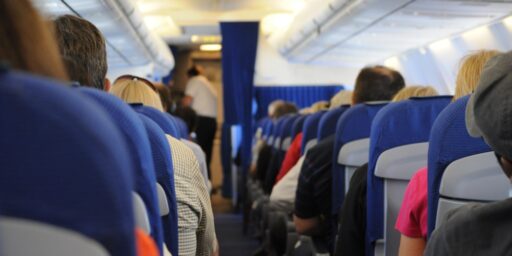
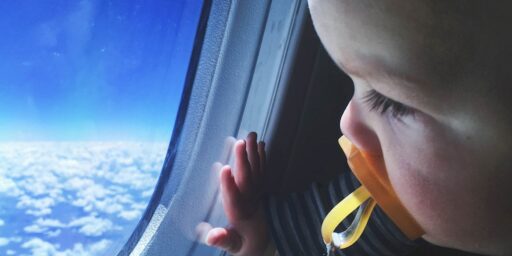
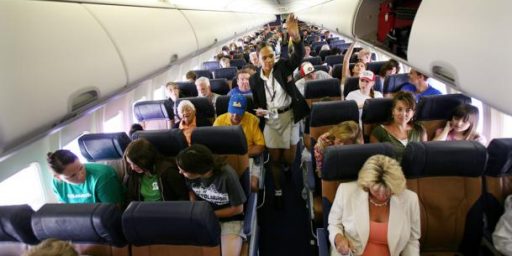
A few years ago, I could virtually guarantee that on a given flight, there was nobody sitting in the middle seat in any of the rows apart from groups and families. I was almost never on a full flight unless it was a short connection like KC to Chicago.
Nowadays, flights are almost always full. It makes sense that it would be more profitable for airlines to do it this way. Even a single trip is expensive.
Sure. It just goes opposite the ideal that businesses profit more when customer service is better. Airlines have generally worked in opposite direction, albeit some say the low frills carriers actually do well in this area.
This is why I laughed when Gary Johnson suggested that the airlines take over airport security because they have an “incentive to provide good customer service.” It made me wonder if Gary Johnson has ever flown on an airline. Ever.
Indeed. The airlines can’t even figure out how to get people boarded in under 45 minutes.
But I thought that deregulation was supposed to usher in the golden age of air travel. No?
@sam –
That depends on what you look for in a golden age. Certainly air travel is now much more affordable than it used to be. But that comes with tradeoffs.
@Alex:
Indeed, the very affordability IS a trade-off of sorts. Making anything available to the masses lowers the prestige value and sense of luxury. And, quickly, actual luxury — flying is basically a faster version of a Greyhound bus now.
Yeah, that is the tradeoff, as James says. That was always the argument, dereg the airlines and lower fares would follow. But the airlines, when they’re not in serial bankruptcy, are cranking the real cost of flying up with things like baggage and pillow fees, and no doubt next, onboard pay toilets. Does anybody like to fly these days? I admit I’m not terribly clear in my own mind about how I really feel about this. I just remember watching the advocates of deregulation going on and on about how wonderful it would be if…. Well, it’s cheaper, but it sure as hell ain’t all that wonderful.
Publishers ask you what your demands are for flying to gigs. Mine are regular Jet Blue, Virgin America coach, or anyone else’s Business. I try to be easy-going about this but I’m not going to get in another legacy airline coach seat.
The problem that de-reg has led to is a large number of awful, miserable, unhealthy, filthy cheap seats, and a small number of slightly less awful seats that cost 8 times as much. If you want a really nice seat it’s 20 times as much but they’re only available on a fraction of planes anyway.
Jet Blue, Virgin America, and the sooner they put the rest of those companies out of business the better.
I like flying more than I did a few years ago. The airlines now offer economy seats with extended legroom without having to haggle for an exit row or front seat. It’s marvelous. Plus, for $6 on some flights, you can get DirecTV. The elimination of in-flight meals are no great loss. And the one big thing that has gotten worse, airline security, is not exactly a product of deregulation. I suppose the fact that planes are more crowded than they used to be is another drawback, but it’s more efficient that way. And I take some comfort in knowing that it means that the route is not likely to be cut any time soon.
The one big thing that I hate is the fee for flight changes. Especially when considerable notice is given. I don’t even mind the baggage fees all that much. It makes me more conscientious about what I need to take and what I don’t and the alternative is likely higher fares, which are harder to avoid. Often, when I see people taking three luggage items with one that pretty obviously will have to be checked at the gate, I think Spirit Airlines may have the right idea on that. But so long as you know ahead of time what the fees are going to be, you can factor that in to the cost. That’s what I hate about flight-changes. It gets people that don’t know that their plans are going to change and when they really have no other choice.
Toilet charges would be grounds for a boycott (or government action). I really don’t see our airlines following RyanAir’s lead on that.
The problem that de-reg has led to is a large number of awful, miserable, unhealthy, filthy cheap seats, and a small number of slightly less awful seats that cost 8 times as much.
Continental and United (individually, soon collectively) have seats with extended legroom for a reasonable upcharge ($40-70). It’s amazing what a difference that makes. Even though the seats aren’t any wider, the legroom means that you aren’t shifting to one side or the other, so you and the guy next to you are less likely to be bumping arms.
It just goes opposite the ideal that businesses profit more when customer service is better.
This depends pretty significantly on the industry. In the fact of stiff price-competition, customer service is one of the first things to go. People complain when customer service gets outsourced to India, but they don’t make decisions on that basis most of the time. Personally, I put a premium on customer service, but not a lot of people seem to.
Every business has a key metric, people. In the airline business its “load factor.” That’s all that is happening.
Silly comment #1. “It just goes opposite the ideal that businesses profit more when customer service is better.”
Not a chance. No real businessman ecer said, or believed that. Is Wal-Mart “primo customer service?” Compared to Cartier?
Silly Comment #2. “The airlines can’t even figure out how to get people boarded in under 45 minutes.”
No, the passengers can’t figure it out, what with some bringing their entire life’s posessions on board. The airlines could fix it, but at the risk of pissing off the customers. And what does that tell you?
It tells you this: “Making anything available to the masses lowers the prestige value and sense of luxury. And, quickly, actual luxury — flying is basically a faster version of a Greyhound bus now.”
Exactly. Its a price game now, unless you want to pay up. (First class, or private jet) There are fundamentally only about 4-5 real business models, people. The airline business went from a hybrid high quality/differentiation model to low cost production. Everything about the airlines is attendant to the LCP model.
This is not rocket science people.